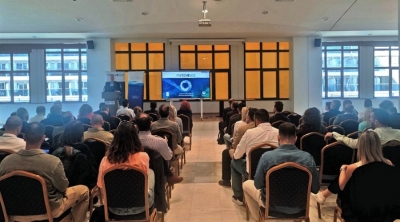Enhanced safety culture for maritime decarbonization requires the cultivation and development of soft skills, as well as the continuous training and retraining of employees in new technologies, according to the conclusions of the workshop organized by the Hellenic Marine Environment Protection Association (HELMEPA) in collaboration with Piraeus Port Authority (PPA S.A.) with extensive participation of employees and executives of PPA S.A. and other Greek ports, as well as representatives of the wider maritime community.
For ports in particular, challenges for the green transition include the shore-based electrification of ships (cold ironing), the properties, characteristics and safe use of alternative fuels, as well as the need for continuous education and training of employees. Particular emphasis was placed on soft skills that employees and workers will need to cultivate or enhance, such as the importance of situational awareness and sense of responsibility, continuous learning and skills development, and adaptability. The workshop presented evidence from important research projects involving the Hellenic Centre for Marine Research (HCMR), the National Technical University of Athens and academic institutions, who agreed to collaborate with METAVASEA, given the need for a broader understanding of the overall framework for the green, digital and sustainable transition towards the decarbonization of shipping and ports.
During the above workshop, titled "Enhanced Safety Culture for Maritime Decarbonization”, held at the premises of PPA S.A. on 26 April 2024, the purpose, objectives, and results of the METAVASEA project, implemented by HELMEPA with 6 main and 12 cooperating partners and the support of the British charitable foundation Lloyd's Register Foundation, were presented (George Markezinis, HELMEPA Project Manager). Specifically, the following topics were analyzed: the impact of climate change on oceans (Dr. Alexandra Gogou, Research Director at the Institute of Oceanography of the Hellenic Centre for Marine Research (HCMR), the port framework for maritime decarbonization (Dr Ioannis Prousalidis, Director of the Marine Engineering Laboratory of NTUA), safety aspects of alternative fuels and decarbonization technologies (Christoforos Georgakopoulos, Global Technical Client Care Senior Specialist, Lloyd's Register), cold ironing in ports (Dr. Manolis Nikolaidis, Managing Director, Premium Consulting), and soft skills for achieving the goal of maritime decarbonization (Maria Karachaliou, GTCC Executive Assistant to GTCC Director, Trainer and Learning and Development Coordinator, Lloyd's Register). A discussion with the participants followed and interesting views were recorded, which will be further exploited in the context of the research phase of the METAVASEA project.
METAVASEA aims to map the existing infrastructure and new skills required for maritime decarbonization in Greece, Cyprus and the Eastern Mediterranean, as well as to empower seafarers, port workers and maritime executives through the development of flexible training tools for retraining. It is noted that the programme provides for the training and re-training of 1,500 employees on issues related to new fuels, enhanced safety culture onboard and in ports, digital transition, soft skills, environmental leadership and awareness-raising for the protection of the marine environment. However, its additional objectives are to enhance the participation of shipping companies and port organizations in decarbonization initiatives, to measure the level of preparedness of shipping and coastal communities in the use of new fuels, to identify related opportunities, gaps and challenges in the Eastern Mediterranean, to prevent maritime accidents by improving operational efficiency in ship and port operations, and to raise awareness among 10,000 students, 750 teachers and about 2 million inhabitants of the Eastern Mediterranean.





